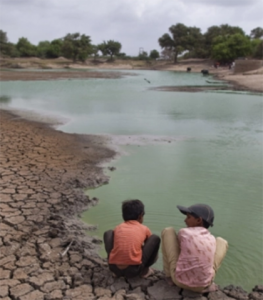UN a step closer to recognising climate refugees
The United Nations has moved a step closer to affording refugee status to people displaced from their homes because of climate change-induced disasters.
A new UNHCR paper titled ‘Legal considerations regarding claims for international protection made in the context of the adverse effects of climate change and disasters’ marks an important step forward for an organisation that has, to date, been reticent to declare its position on climate displacement.
 But the paper says that climate change and disasters are impacting the lives of millions of people across the globe, and forcing many people to leave their homes, including in some cases to cross international borders.
But the paper says that climate change and disasters are impacting the lives of millions of people across the globe, and forcing many people to leave their homes, including in some cases to cross international borders.
“Their adverse effects will often expose the limited ability of an affected community to adapt, reflecting its pre-existing vulnerabilities. Such effects may emerge suddenly, or gradually over time, triggering human, material, economic or environmental losses,” it says.
“The relationship between climate change and human rights is increasingly recognized in law, including in the UN Human Rights Committee’s decision in the Teitiota case. The adverse effects of climate change and disasters have diverse consequences for States and societies, as well as the well-being and enjoyment of rights by individuals, as recognized in judgments and decisions in various jurisdictions.
“Such consequences may include the growing prevalence, spread and severity of new and re-emerging diseases; food insecurity and famine; increasingly scarce habitual land and potable water; exposure to exploitation and trafficking; as well as to human, material, economic or environmental losses, including lost incomes, homes, livelihoods and even lives,” the paper says.
“The adverse effects of climate change and disasters are often exacerbated by other factors such as poor governance, undermining public order; scarce natural resources, fragile ecosystems, demographic changes, socio-economic inequality, xenophobia, and political and religious tensions, in some cases leading to violence. As a result of these negative impacts of climate change and disasters, combined with social vulnerabilities, people may be compelled to leave their country and seek international protection,” the paper says.
While the paper does not seek ultimately to redefine international and regional law relating to protection of forcibly displaced people, it does highlight how provisions of the 1951 Refugee Convention, regional refugee protection agreements, human rights treaties, and human rights law can and should be used to provide more robust protections for those displaced by climate change.
The paper opens the door for the protection of people displaced by climate in several of ways.
It argues that an assessment of refugee status under the Refugee Convention should not be interpreted narrowly based on the direct impacts of natural disaster — but that social and political considerations must also be taken into account.
The paper says the adverse effects of climate change are often worsened by factors such as “poor governance, scarce natural resources, socioeconomic inequality, political and religious tensions, and xenophobia — many of which could give rise to claims of persecution”.
It also asserts that temporary protection may be insufficient if the country of origin is unwilling or unable to stabilise situations of disaster or adapt to climate change. It argues that in these cases, displaced people should be able to apply for and receive international protection, whether asylum or another mechanism.
The paper also reinforces the relationship between climate change and human rights.
It makes references the recent Teitiota v New Zealand case heard by the UN Human Rights Committee last January.
In its ruling, the committee found that Ioane Teitiota, a Kiribati national who applied for asylum in New Zealand due to climate change and was denied refugee status, would not face imminent harm if he were forced to return to Kiribati.
But the committee acknowledged that the effects of climate change may be more impactful in 10 to 15 years and this assessment may change in future cases.
The legal considerations paper further supports this argument, pointing to a range of human rights that could be negatively impacted by climate change and disasters, including “the right to life; physical integrity; an adequate standard of living; health, water and sanitation; and self-determination and development.”
It also says those risks could amount to persecution within the meaning of the 1951 convention and that the adverse impacts of climate change “may strengthen rather than weaken the evidence” of a fear of persecution.
The paper indicates that UNHCR is re-evaluating its position on climate change and refugee protection as well as signalling it intends to take on a leading role and translating the principles outlined in the paper into global practice.
The paper comes as the Earth’s average temperature has risen more than 1.2 degrees since the late 19th century, according to new data from NASA.
The NASA data says the last seven years have been the warmest on record, typifying the ongoing and dramatic warming trend.
Read the UNHCR paper here: https://www.refworld.org/pdfid/5f75f2734.pdf












